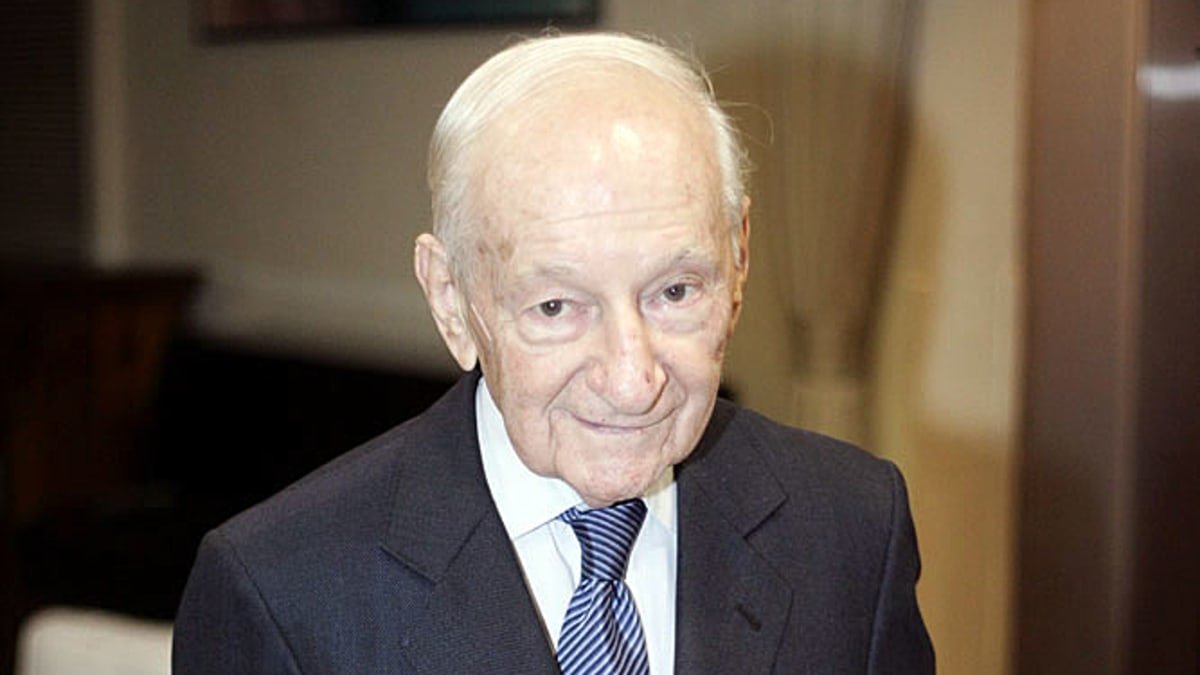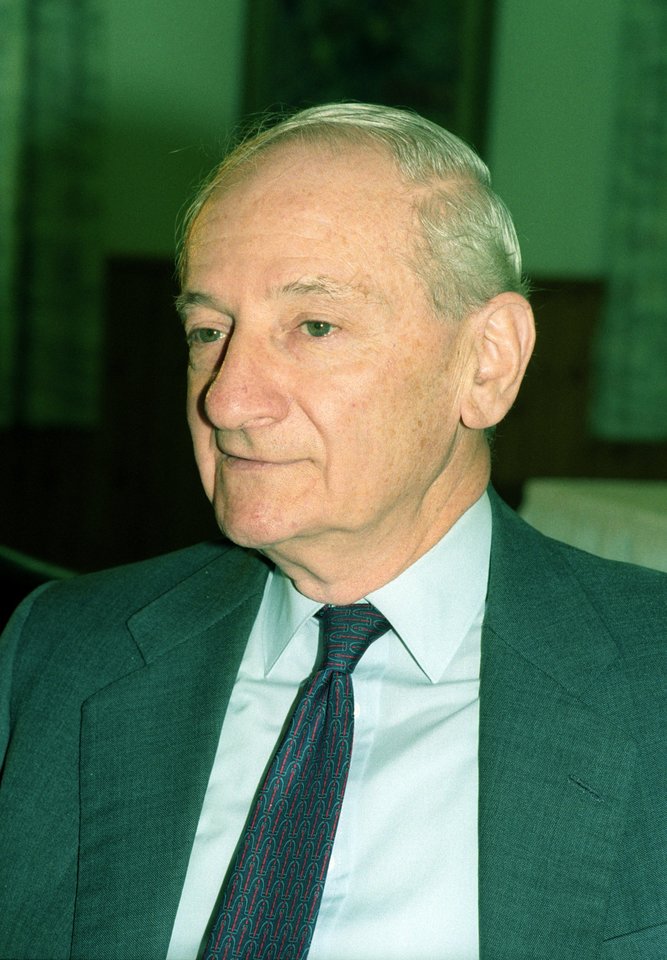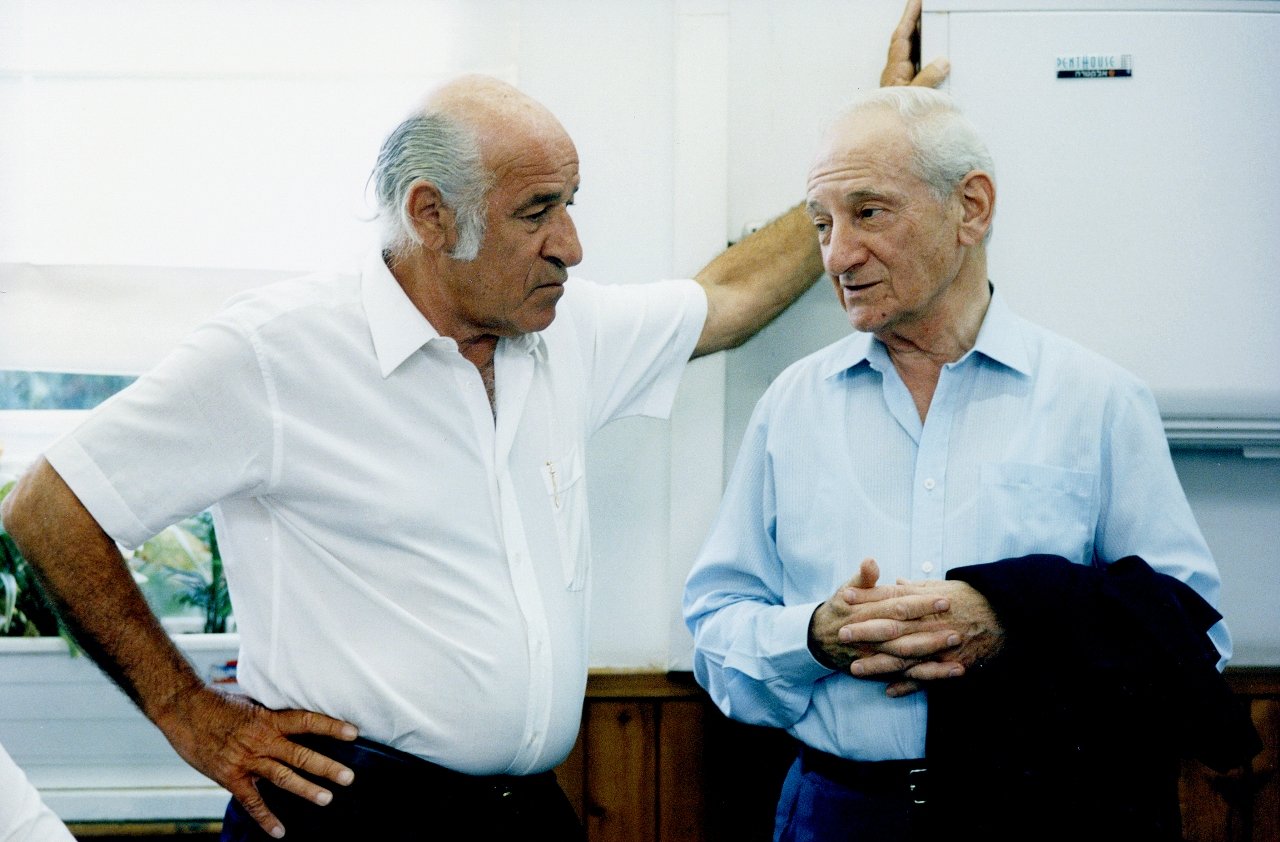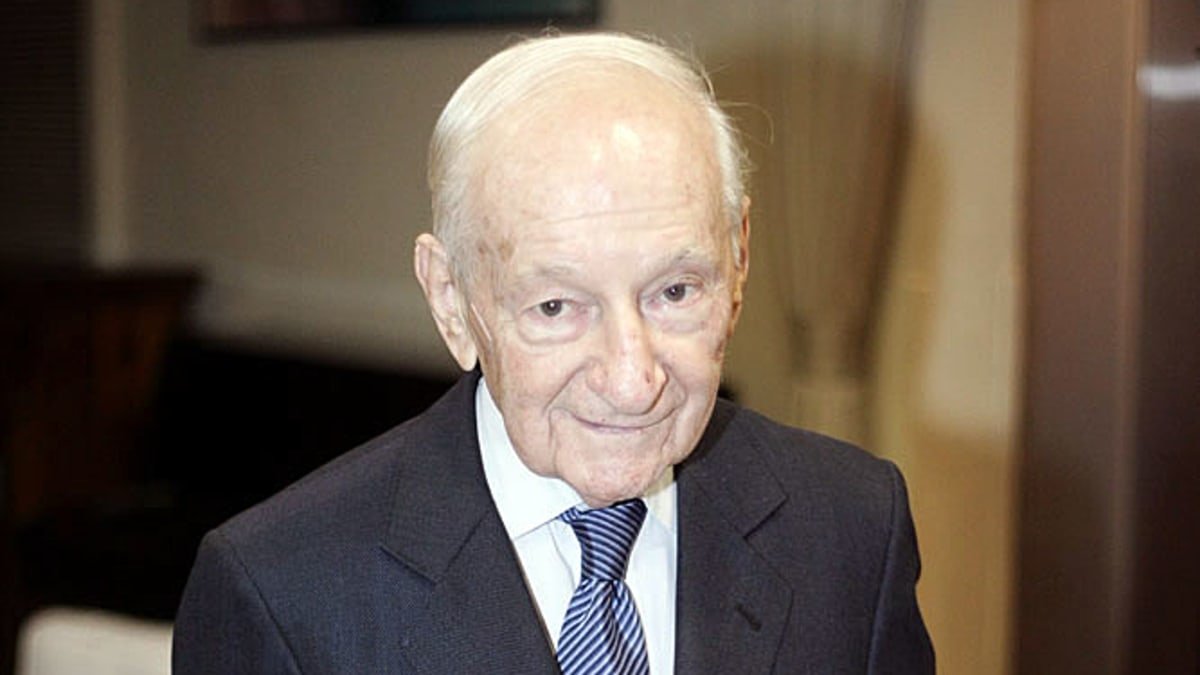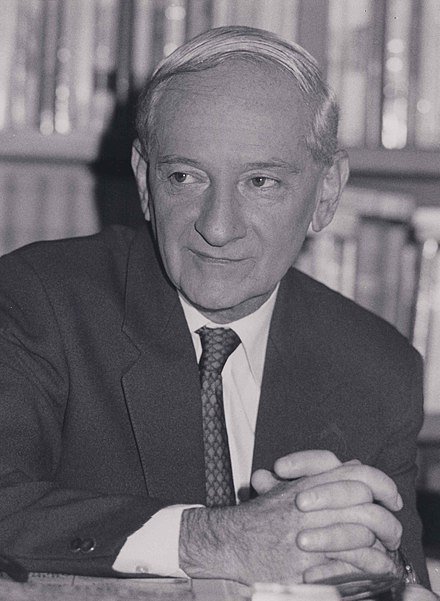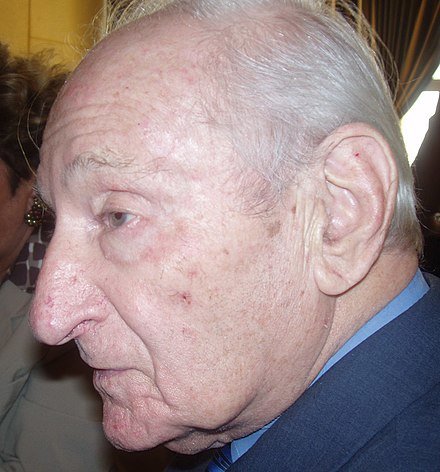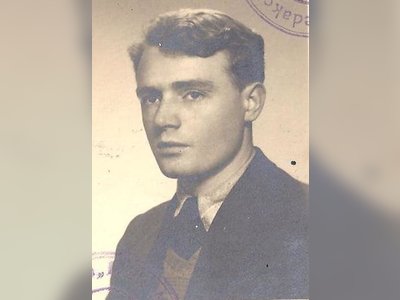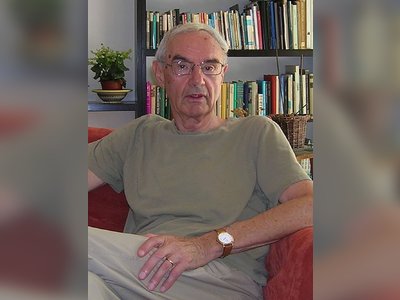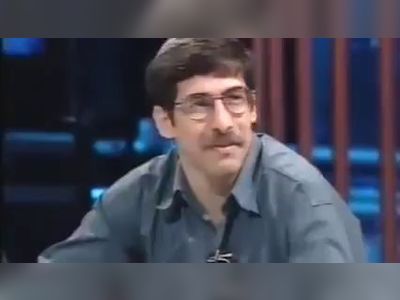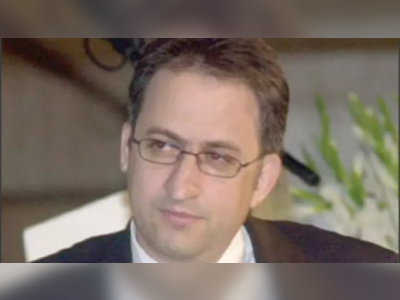מורשת גדולי האומה
בזכותם קיים
beta
Title: Dov Yudkovsky: A Pioneer in Israeli Journalism
Dov Yudkovsky (March 24, 1923 – December 28, 2010) was an influential Israeli journalist and editor who played a significant role in shaping the landscape of Israeli media. He served as the editor of "Yedioth Ahronoth" for many years, making it one of the most widely circulated newspapers in Israel. Later, he also edited "Maariv." In 2002, he was honored with the Israel Prize for Journalism.
Biography
Dov Yudkovsky was born in Warsaw, the capital of Poland, on March 24, 1923. Shortly after his birth, his family moved to Antwerp, Belgium. During World War II, the family fled to France. However, they were arrested by the French authorities and sent to the Drancy internment camp, from where Dov was transported in overcrowded cattle cars to Auschwitz. He endured forced labor in Auschwitz and spent a brief period in the camp itself. As the war was nearing its end, he joined the infamous Death March.
In 1945, he immigrated to Israel. He studied philosophy, international relations, and French culture at the Hebrew University of Jerusalem. During this time, he began working at the Jerusalem branch of "Yedioth Ahronoth" after being hired by its owner, Yehuda Mozes. In 1948, following a rift among the majority of journalists at "Yedioth Ahronoth," who left the newspaper to establish "Maariv," Yudkovsky stepped in to help save the struggling newspaper and founded a special Jerusalem edition of "Yedioth Ahronoth."
From 1953, Yudkovsky became the central figure and practical editor of "Yedioth Ahronoth," and from 1986 to 1989, he served as its chief editor. During his tenure, Yudkovsky transformed "Yedioth Ahronoth" into a newspaper with a broad and diverse readership, gradually increasing its circulation until it became the most widely read newspaper in Israel by the late 1970s. He achieved this primarily through the formula he developed, emphasizing accessibility for every reader through meticulous and concise editing and writing in short and impactful sentences.
In September 1989, Yudkovsky was dismissed from the leadership of "Yedioth Ahronoth" following a power struggle with the owner, Arnon Mozes, and he decided to resign.
During those days, the newspaper "Maariv" was acquired by British-Jewish billionaire Robert Maxwell, who aimed to revamp it by injecting substantial funds and replacing its management and journalists. Yudkovsky was called upon to take on the role of the business manager for Maxwell in Israel, later becoming the CEO of Maariv and subsequently its chief editor. This transition, which involved crossing over to the rival newspaper, shocked the media world, given Yudkovsky's long association with "Yedioth Ahronoth." Following Maxwell's death and the acquisition of "Maariv" by the Nimrodi family in March 1992, Yudkovsky left the newspaper. From then until his passing, he served as the director of the "Koteret" School of Journalism, which he co-founded. Additionally, he served as a member of the board of directors of Tel Aviv University.
Yudkovsky was convicted in the Peace Court of transferring classified information during the Demjanjuk trial.
In 2000, he received the Sokolov Award for Journalism, and in 2002, he was awarded the Israel Prize in Communication.
He was married to Leah, and they had one daughter and grandchildren.
Yudkovsky and the Maariv vs. Yedioth Ahronoth Battle
The newspaper "Maariv" was founded on February 15, 1948, by Azriel Carlebach, who had previously been the editor of "Yedioth Ahronoth." During the so-called "Putsch," Carlebach transferred all the staff, management, and printing facilities of "Yedioth Ahronoth" to the new newspaper overnight, leaving Yehuda Mozes, the owner of "Yedioth Ahronoth," without any employees. Mozes did not surrender and continued to publish the newspaper. Advertisers and newspaper vendors became writers when necessary, trying to find readers. Some of Mozes' family members stood on street corners and attempted to sell newspapers that no one wanted.
The dire situation of "Yedioth Ahronoth" during that time can be understood from an internal report written by Azriel Carlebach after the first year of "Maariv's" establishment:
"Yedioth Ahronoth did not take off from February 15, 1948... It began with a lack of employees, machinery, and readers, all at once, and its circulation dropped to zero... All we do is undermine the credibility of the contents... Although this adaptation was done in a very poor style, with minimal content and questionable taste, it has never affected 'Maariv'... And this is how he raised its circulation from absolute zero to 15,000 copies..."
This initial recovery was achieved primarily through the assistance of two individuals whom Yehuda Mozes called upon for help—his son, Nahum, and Dov Yudkovsky, a distant relative.
During the "Putsch," Yudkovsky was in besieged Jerusalem, studying at the university, and working as a telephone operator transferring news to the Tel Aviv office of "Yedioth Ahronoth." Due to the siege, Yudkovsky could not reach Tel Aviv, so he contributed to the newspaper by establishing a Jerusalem edition of "Yedioth Ahronoth." He improvised printing using a non-electric press, and the edition achieved a circulation of 6,000 to 10,000 copies per day. He was joined by Menachem Barash, a Jerusalem-based writer, and senior journalist Aviezer Golan, who had also intended to leave for "Maariv" but got stuck in Jerusalem during the siege.
When the siege was lifted, Yudkovsky came to Tel Aviv to find a newspaper on the verge of collapse. "Maariv," the competing newspaper, had a circulation averaging 25,000 copies, and sometimes even reached 33,000 copies on special days. In contrast, "Yedioth Ahronoth" had almost no circulation left, and to stay in the public consciousness and market, Yehuda Mozes paid children to run in the streets and yell, "Yedioth Ahronoth." Mozes also began selling properties to cover the newspaper's growing losses.
It took many more years for "Yedioth Ahronoth" to fully recover from this crisis and challenge its rival "Maariv," which had held the slogan "The Most Read Newspaper in the Country" for over two decades. The turning point came during the Six-Day War, during the pre-war period, when Yudkovsky initiated the distribution of the newspaper for free to hundreds of thousands of recruits, introducing the newspaper to individuals who had never read it before. In the early 1970s, the circulation of both newspapers began to converge. By the end of the 1980s and the beginning of the 1990s, "Maariv's" circulation dropped to less than 100,000 newspapers a day, one-third of "Yedioth Ahronoth's" circulation in the middle of the week, and "Maariv" suffered heavy losses. When it was acquired by British-Jewish billionaire Robert Maxwell in the early 1990s, "Maariv" was on the verge of closure.
Yudkovsky's Editorial Approach
In the judges' comments for the Israel Prize for Journalism, Yudkovsky's editorial approach was defined by his own words:
"The person who influenced me more than anyone else in my newspaper philosophy was my teacher in philosophy, Professor Leon Roth, who used to say at the beginning of every academic year: 'What Kant said in a convoluted and tedious way, Plato said two thousand years earlier in a clear and engaging manner for reading.' I reached the conclusion that it is possible to write the most serious and complex things clearly and engagingly. By doing so, the level is elevated, and a newspaper is created that a government minister is not ashamed to read and whose editor-in-chief is not afraid to read aloud."
Behind this statement lies a long-term strategy that led Yudkovsky to success and, more importantly, to the creation of a new language of communication that became the hallmark of Israeli media as a whole.
- דב יודקובסקי – ויקיפדיהhe.wikipedia.org
